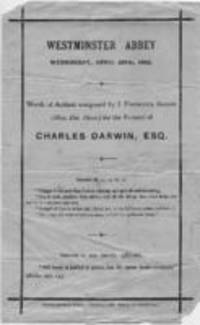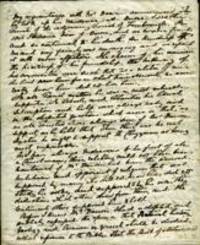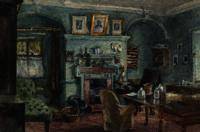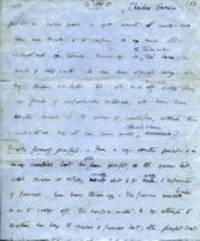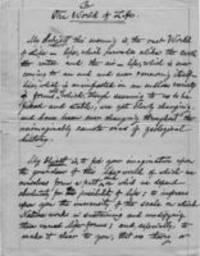- Browse Repository
- College of Arts & Sciences
- CWRU Dittrick Medical History Center
- Robert M. Stecher Collection of Darwiniana
Robert M. Stecher Collection of Darwiniana
The Robert M. Stecher Collection of Charles Darwin Books and Manuscripts
Show moreDarwin asks Grant Allen if he has seen an article in 'Revue Scientifique' (dated May 24, 1879) which discusses Allen's book 'Colour-sense' favorably. Postcard from Down, Beckenham, Kent. Transcription: "Grant Allen Esq 22. Bonchard [Pl.] New Kensington London Have you seen an article on you by a [] man, [], in Revue Scientifique no. 17" May 24" 79?- It has pleased me greatly on your account. I suppose you [] easily see it in London; [] I could [] it you. No answer necessary C.D. May 26"
The Robert M. Stecher Collection of Charles Darwin Books and Manuscripts
Show less
Show moreRequests return of August Weismann's letter which refers to eggs. Curious about the drawing of the [caterpillar] Transcription: "Post Card Beckenham The Address only to be written on this side. W.H. Bates Esq B. Geograph. Sqr. Savilla Row London.- From Mr. C. Darwin, Down, Beckenham. Please return my Prof. Weismann's letter, as it contains informa about eggs. I shall be curious to hear some time how you [] in your negotiations about the []- C.D. Feb 6 1877" Postcard, signed by sender to [Henry Walter Bates].
The Robert M. Stecher Collection of Charles Darwin Books and Manuscripts
Show less
The Robert M. Stecher Collection of Charles Darwin Books and Manuscripts
Show moreRecollections of Charles Darwin, written by John Brodie Innes. Transcription: "My acquaintance with Mr. Darwin commenced when he took up his residence at Downe. I was then Curator of the adjoining Parish of Faraborough. In 1846 I became Vicar of Downe, and we became friends and so continued to his death. His kindness to me and my family was unvarying and we repaid it with warm affection. The charm of his manners, the heartiness of his friendship, the bullioning of his conversation were such that as a relation of mine who lived near him for a short time observed, no one really knew him did not love him. In all Parish matters he was a most valuable supporter. In Schools, and Charities his liberal subscriptions and help were always ready and in the disputed questions which arose in that, as in all Parishes I was always sure of Mr Darwin's support as he held that where there was no real objection he ought to support the Clergyman as being most responsive. As I have always endeavour to be first of all a Churchman, these relations could not have been maintained if M' Darwin had been the [stalwart?] unbeliever and opponent of religion that was supported by many who did not know him, did not study his work, and supposed to be his own the deductions which others drew from them, and the sentiments others supposed him to hold. Before I knew Mr Darwin I had adopted, and publicly expressed the opinion that Natural history, geology and Science in general should be studied without reference to the Bible. That the Book of Nature and Religion proceeded from the same source and that properly understood they proceeded on parallel lines and would never [crop]. [] sermon. Mr. Darwin from his own side held the same views of course any conversations we had on [] religious matters are as sacredly private now as in his life, but the quaint conclusion of one may be recorded. We had been speaking of the apparent diversity between some supposed discoveries and the Book of Genesis. He said "you are a theologian, I am a Naturalist. I pursue my investigations without considering how they affect Scripture, I do not attack [] and I think [] can take care of himself. Later he wrote. I do not think I [] directly attacked religion or the Clergy and reformed to an abusive pamphlet by a clergyman which I should laugh at, and which might have given him cause for bitterness. So we never attacked each other. He wrote that you are one of the rare mortals with whom one can differ and just feel no shade of bitterness, and he would be proud if any one could say the same of him. The queietness with which he received attacks is shown by his saying I should laugh at the abusive pamphlet, and another instance is that when the Bishop of Oxford's review of Origin of Species appeared in the Quarterly he wrote a postscript in a letter to me "If you have not seen the Quarterly do get it, the Bp of Oxford has made such capital fun of me and my Grandfather. I was at [] with the Bp when I got the letter, and showed it to him, he said I am glad he takes it in this way he is such a capital fellow". Notice his most remarkable accuracy in all observations. The [] of years to ascertain the reversion of kinds of pigeons to the original type. Of bees which I [] him to observe and in which, and other matters he always sug- gested doubts when I thought facts were proved and required further observation. This remarkable thoughtfulness shown in all his conversation. On one occasion after a discussion on a Parish matter he came to me at night to say what he had said was really accurate but it had occurred to him that I might have drawn an erroneous inference and he would not sleep till he had explained it. I feel sure that if any day he had discovered some facts which would uproot his theories he would have placed them on record for publication at once. His bad health prevented his conversing for above half an hour at a time and he was obliged to break off and lie down because he felt sick. His quotes, to carry pebbels in hand and drop one at the end of each second of the plantation walk to be sure he had accomplished the distance at [] 6 months resolve to keep the box in the cellar and key in the []. Another 6 months, only to take a pinch where from home when he would to get one in my study. On my Cast [] B.I. + I have been fast friends for 30 years, he never [] afreed on any subject but one and then we looked hard at each other and thought one of us must be very ill. for substance sent it of [] 20 years ISS with seven letters, some of which are referred to above"
The Robert M. Stecher Collection of Charles Darwin Books and Manuscripts
Show less
The Robert M. Stecher Collection of Charles Darwin Books and Manuscripts
Show moreManuscript pages from Vegetable Mould and Earthworms (p. 292, 1.2 to p. 293, 1.3 in 1881 edition). Text revised slightly in published edition. Transcription: "c. 1880 Charles Darwin period as 2000 years a great amount of Earth will have been brought to the surgace on most old embankments of tunnels, especially on [], + most of this Earth will have been washed away. We may, therefore, conclude that all such ancient works, when not formed of [] materials, will have been [] [] in the course of centuries, although their inclination may not have been greatly []. Fields [] ploughed - From a vy remote perioud + in many countries land has often been ploughed, so the [], called [] or [], usually about 8 ft across, + [] by furrows, have been thrown up. [] so as to carry off the surgace water. In my attempts to ascertain how long the [] + furrows last, after [] land has been [] in [], obstacles of many kinds were encountered. It is rarely known when a field was last ploughed; + some fields which were thought to have been in [] for time immemorial were afterwards found to have been ploughed only 50 or 60 years before. [] the easy fast embankment or tumulus 2000 years old would if it were not removed have raised about 200 times through the intestines of [], + thus have been brought to the surface. As on each occasiona the castings in their soft condition would be eminently liable to be washed to a lower level, it is impossible to doubt that all ancient embankments and tumuli must in the course of centuries have been somewhat lowered though their slopes may not be greatly altered."
The Robert M. Stecher Collection of Charles Darwin Books and Manuscripts
Show less
Show moreWorld of Life manuscript. Two page manuscript copy of what appears to have been an address of some sort apparently given around fifty years after the publication of Darwin's 'Origin'. Transcription: "The World of Life My Subject this evening is the vast World of Life - life, which pervades alike the Earth the water and the air - life, which is ever coming to an end and ever [] itself - life, which is manifested in an endless variety of forms all of which though seeming to us to be fixed and stable, are yet slowly changing, and have been ever changing throughout the unimaginable remote eras of geological history. My object is, to fix your imagination upon the grandeur of this life world of which we ourselves form a part and on which we depend absolutely for the possibility of life; to impress upon you the immensity of the scale on which Nature works in sustaining and modifying these varied life-forms; and, especially, to make it clear to you, that no theory or explanation of Nature's method in the continuous development of these life-forms can have the slightest value, which does not, at every step of the process, take full account of this immensity, as an essential factor in the process of modification. My claim is that Darwinism is the one and only theory yet put forward which fully satisfies these conditions; it is also one of the most simple and easy of comprehension in the whole range of science; yet, after fifty years of continuous exposition, none is so widely and persistently misunderstood. It is not my intention to combat these various misapprehensions in detail, but it is my hope, if I can succeed in placing the subject before (2.a)"
The Robert M. Stecher Collection of Charles Darwin Books and Manuscripts
Show less

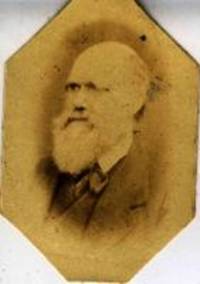

![Postcard from Charles Darwin to [H. W. Bates] 10829](https://digital.case.edu/sites/default/files/styles/islandora_imagecache_image_style_medium/public/externals/3dd7441c9febf137851d826de9ed2dd1.jpg?itok=exR8mgN-&pid=ksl:ditalldar00063&iic=true)
